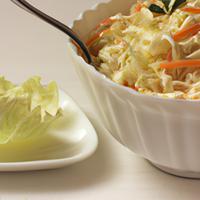
1 serving (100 grams) contains 150 calories, 1.0 grams of protein, 12.0 grams of fat, and 10.0 grams of carbohydrates.

Log this food in SnapCalorie

Nutrition Information
Calories |
357.1 | ||
|---|---|---|---|
% Daily Value* |
|||
| Total Fat | 28.6 g | 36% | |
| Saturated Fat | 4.8 g | 24% | |
| Polyunsaturated Fat | 0 g | ||
| Cholesterol | 23.8 mg | 7% | |
| Sodium | 476.2 mg | 20% | |
| Total Carbohydrates | 23.8 g | 8% | |
| Dietary Fiber | 4.8 g | 17% | |
| Sugars | 19.0 g | ||
| protein | 2.4 g | 4% | |
| Vitamin D | 0 mcg | 0% | |
| Calcium | 71.4 mg | 5% | |
| Iron | 1.2 mg | 6% | |
| Potassium | 357.1 mg | 7% | |
* Percent Daily Values are based on a 2,000 calorie diet. Your daily values may be higher or lower depending on your calorie needs.
Food Attributes
Source of Calories
About Cream coleslaw
Cream coleslaw is a classic side dish often served in American and European cuisines, typically accompanying barbecue, fried foods, or sandwiches. It features shredded cabbage and carrots as its base, mixed with a creamy dressing made from mayonnaise, sugar, vinegar, and sometimes sour cream or yogurt. Variations may include onions, celery, or apples for added texture and flavor. Nutritionally, cabbage and carrots provide dietary fiber, vitamins C and K, and antioxidants, which support digestion and overall health. However, the creamy dressing can be high in calories, saturated fat, and sugar, making it less suitable for low-calorie or heart-healthy diets. Opting for lighter dressing alternatives, such as those made with yogurt or reduced-fat ingredients, can improve its nutritional profile. Cream coleslaw offers a refreshing crunch and balance of sweet and tangy flavors, but moderation is key to enjoy it as part of a balanced diet.



